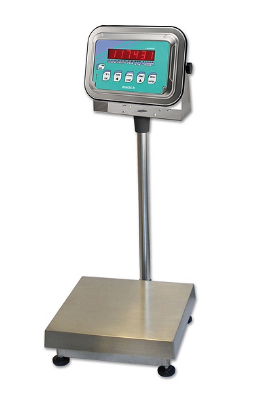A bench scale is a type of weighing scale that is designed for use on a workbench or countertop. It’s a versatile and compact weighing solution used in various industries for weighing small to medium-sized items or materials. Bench scales are commonly found in laboratories, manufacturing facilities, retail environments, and other settings where precise weight measurements are required.
Here’s an overview of bench scales and their significance in industries:
ACN
- Painted Steel Tubular Structure
- AISI 304 Stainless Steel Loading Plate
- Alumunium Alloy IP65 Load Cell
- Accuracy Class C3 (OIML R60)
- AC 6, 15, 30, 50, 150, 300: CLASS C3/C4
- Feet in galvanized steel and polyamide


AIN
- AISI 304 Stainless Steel Tubular Structure
- AISI 304 Stainless Steel Loading Plate
- Alumunium Alloy IP65 Load Cell
- Accuracy Class C3 (OIML R60)
- AC 6, 15, 30, 50, 150, 300: CLASS C3/C4
- Feet in stainless steel and polyamide


AILN
- Painted Steel Tubular Structure
- AISI 304 Stainless Steel Loading Plate
- Welded Stainless Steel IP68 Load Cell (on request: IP69K)
- Accuracy Class C3 (OIML R60)
- Feet in galvanized steel and polyamide


Purpose and Applications:
Manufacturing and Packaging: Industries like food processing, pharmaceuticals, and cosmetics use bench scales for portion control, quality control, and packaging applications.
Retail: Bench scales are used in retail environments, such as grocery stores and markets, for weighing produce, bulk items, and other goods.
Shipping and Receiving: Bench scales can be used to weigh smaller packages and parcels in shipping and receiving departments
Key Features and Components:
Platform: The platform of a bench scale is where the items to be weighed are placed. It can come in various sizes and materials, such as stainless steel or plastic, depending on the application.
Display and User Interface: Bench scales have a display that shows the weight readings. Some models also include advanced features like touchscreens, keypad inputs, and integration with other systems.
Weighing Mechanism: Bench scales use load cells or other weighing mechanisms to measure the weight of items. These mechanisms convert the applied force into an electrical signal that is then converted into weight readings.
Tare Functionality: The tare function allows the user to set the scale to zero with a container on the platform. This enables weighing only the contents of the container, excluding the weight of the container itself.
Connectivity: Many bench scales offer connectivity options, such as USB, RS-232, or Bluetooth, for data transfer to computers, printers, or other devices.
Power Source: Bench scales can be powered by batteries or electricity, depending on the model. Battery-powered scales offer portability and flexibility.
In summary, bench scales are versatile weighing tools used in various industries for accurate and precise weight measurements of small to medium-sized items. They provide convenience, accuracy, and flexibility in a wide range of applications, contributing to quality control, efficiency, and customer satisfaction.

